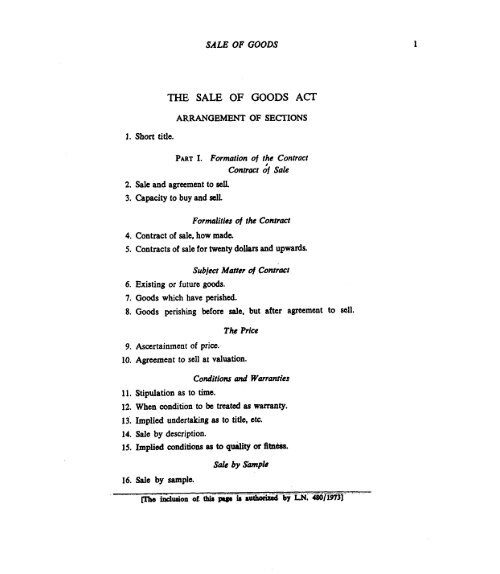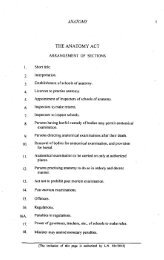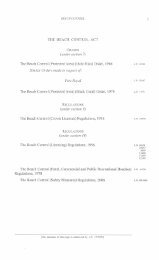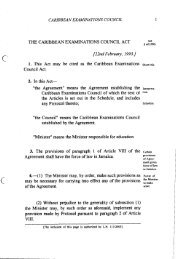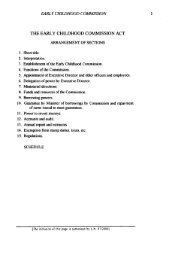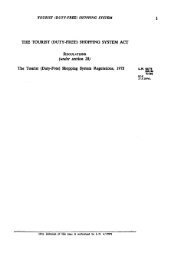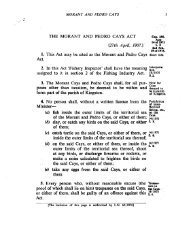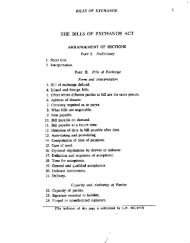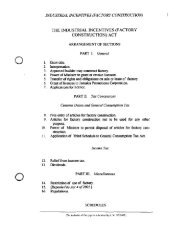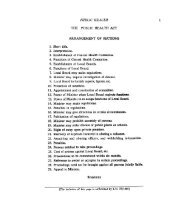THE SALE OF GOODS ACT
THE SALE OF GOODS ACT
THE SALE OF GOODS ACT
Create successful ePaper yourself
Turn your PDF publications into a flip-book with our unique Google optimized e-Paper software.
<strong>SALE</strong> <strong>OF</strong> <strong>GOODS</strong> 11. Short title.<strong>THE</strong> <strong>SALE</strong> <strong>OF</strong> <strong>GOODS</strong> <strong>ACT</strong>ARRANGEMENT <strong>OF</strong> SECTIONSPART I. Formation of the Contractcontract df sale2. Sale and agreement to seU3. Capacity to buy and sell.Formalities of the Contruct4. Contract of sale, how made.5. Contracts of sale for twenty dollars and upwards.6. Existing or future goods.7. Goods which have perished.Subject Matter of Contract8. Goods perishing before sale. but after apment to sell.The Price9. Ascertainment of price.10. Agreement to sell at valuation.Conditions and Warranties11. Stipulation as to time.12. When condition to be treated as warranty.13. Implied undertaking aa to title, etc.14. Sale by description.15. Implid Conditions as to qdty or fitness.16. W e by sample.Sale by Siampb
2 <strong>SALE</strong> <strong>OF</strong> <strong>GOODS</strong>PART 11. Eflect of the ContractTransfer of Property as between Seller and Buyer17. Goods must be ascertained.18. Property passes when intended to pass.19. Rules for ascertaining intention.20. Reservation of right of disposal.21. Risk prima facie passes with property.Transfer of Title22. Sale by person not the owner.23. Sale under voidable title.24. Revesting of property in stolen goods on conviction of offender.25. Seller or buyer in possession after sale.26. Effect of writs of execution.PART III. Performance of the Contract27. Duties of buyer and seller.28. Payment and delivery are concurrent conditions.29. Rules as to delivery.30. Delivery of wrong quantity.3 1. Instalment deliveries.32. Delivery to camer.33. Risk where goods are delivered at distant place.34. Buyer’s right of examining goods.35. Acceptance.36. Buyer not bound to return rejected goods.37. Liability of buyer for neglecting or refusing delivery of goods.PART IV. Rights of Unpaid Seller against the Goods38. Unpaid seller defined.39. Unpaid seller’s rights.Unpaid Seller‘s Lien40. Seller’s lien.41. Part delivery.42. Termination of lien.me inclusion of this page is authorized by L.N. 480/1973]
<strong>SALE</strong> <strong>OF</strong> <strong>GOODS</strong> 3Stoppage in Tramiru43. Right of stoppage in transitu.44. Duration of transit.45. How stoppage in transitu is effected.Resale by Buyer or Seller46. Effect of such sale or pledge by buyer.41. Sale not generally rescinded by lien or stoppage in rransitu.PART V. Actions for Breach of the ContractRemedies of the Seller48. Action for price.49. Damages for non-acceptance.Remedies of the Buyer50. Damages for nondelivery.51. Specific performance.52. Remedy for breach of warranty.53. Interest and special damages.PART VI. Supplementary54. Exclusion of implied terms and conditions.55. Reasonable time a question of fact.56. Rights, etc., enforceable by action.51. Auction sales.58. Repeal.59. savings.60. Interpretation.Dl18 idusion of this page u authorized by LN. 48011973)
<strong>SALE</strong> <strong>OF</strong> <strong>GOODS</strong> 5<strong>THE</strong> <strong>SALE</strong> <strong>OF</strong> <strong>GOODS</strong> <strong>ACT</strong>[Ist July, 1895.1cap. 349.1. This Act may be cited as the Sale of Goods Act. short title.PART I. Formation of the ContractContract of Sale2.41) A contract of sale of goods is a contract whereby meandthe seller transfers or agrees to transfer the property in treytgoods to the buyer for a money consideration, called theprice. There may be a contract of sale between one partowner and another.(2) A contract of sale may be absolute or conditional.(3) Where under a contract of sale the property inthe goods is transferred from the seller to the buyer thecontract is called a sale; but where the transfer of theproperty in the goods is to take place at a future time orsubject to some condition thereafter to- be fulfilled thecontract is called an agreement to sell.(4) An agreement to sell becomes a sale when thetime elapses or the conditions are fulfilled subject to whichthe property in the goods is to be transferred.3. Capacity to buy and sell is regulated by the general Cawcitytobuy and sell.law concerning capacity to contract, and to transfer andacquire property :Provided that where necessaries are sold and deliveredto an infant, or minor, or to a person who by reasonof mental incapacity or drunkenness is incompetent to contracthe must pay a reasonable price therefor.mo indukon of this page is authorized by L.N. 480119731
6 <strong>SALE</strong> <strong>OF</strong> <strong>GOODS</strong>Necessaries in this section mean goods suitable to thecondition in life of such infant or minor or other person,and to his actual requirements at the time of the sale anddelivery.Contract ofsale, howmade.Contractsof sale fortwentydollars andupwards.Formalities of the Contract4. Subject to the provisions of this Act and of anystatute in that behalf, a contract of sale mav be madein writing (either with or without seal), or by word ofmouth, or partly in writing and partly by word of mouth,or may be implied from the conduct of the parties :Provided that nothing in this section shall affect thelaw relating to corporations.5.-(1) A contract for the sale of any goods of the valueof twenty dollars or upwards shall not be enforceable byaction unless the buyer shall accept part of the goods sosold, and actually receive the same, or give something inearnest to bind the contract, or in part payment, or unlesssome note or memorandum in writing of the contract bemade and signed by the party to be charged or his agentin that behalf.(2) The provisions of this section apply to everysuch contract, notwithstanding that the goods may beintended to be delivered at some future time, or may notat the time of such contract be actually made, procured,or provided, or fit or ready for delivery, or some act maybe requisite for the making or completing thereof orrendering the same fit for delivery.(3) There is an acceptance of goods within themeaning of this section when the buyer does any act inrelation to the goods which recognizes a pre-existing contractof sale whether there be an acceptance in performanceof the contract or not.[The inclusion of this page is authorized by L.N. 480/1913]
<strong>SALE</strong> <strong>OF</strong> <strong>GOODS</strong> 7Subject Matter of Contract6.-(1) The goods which form the subject of a contract Exisbng Orof sale may be either existing goods, owned or possessedby the seller, or goods to be manufactured or acquired bythe seller after the making of the contract of sale, in thisAct called “future goods”.(2) There may be a contract for the sale of goods,the acquisition of which by the seller, depends upon acontingency which may or may not happen.(3) Where by a contract of sale the seller purportsto effect a present sale of future goods, the contractoperates as an agreement to sell the goods.7. Where there is a contract for the sale of specific Goodsgoods, and the goods without the knowledge of the sellerhave perished at the time when the contract is made, thecontract is void.which haveperished.8. Where there is an agreement to sell specific goods, Goodsperishingand subsequently the goods, without any fault on the part before sale,of the seller or buyer, perish before the risk passes to the :;:Elntbuyer, the agreement is thereby avoided.to sell.The Price9.-(1) The price in a contract of sale may be fixed by Ascertainthecontract, or may be left to be fixed in manner thereby $2.Ofagreed, or may be determined by the course of dealingbetween the parties.(2) Where the price is not determined in accordancewith the foregoing provisions the buyer must pay a reasonableprice. What is a reasonable price is a question offact dependent on the circumstances of each particularcase.inclusion of this page is authorized by L.N. 480/1973]
aAgreementto sell atvaluation.Stipulationas to time.WhenCondition tobe treatedas warranty.<strong>SALE</strong> <strong>OF</strong> <strong>GOODS</strong>10.-(1) Where there is an agreement to sell goods onthe terms that the price is to be fixed by the valuation ofa third party, and such third party cannot or does notmake such valuation, the agreement is avoided :Provided that if the goods or any part thereof have beendelivered to and appropriated by the buyer he must pay areasonable price therefor.(2) Where such third party is prevented from makingthe valuation by the fault of the seller or buyer, the partynot in fault may maintain an action for damages againstthe party in fault.Conditions and Warranties11.-(1) Unless a different intention appears from theterms of the contract, stipu1ations:as to time of paymentare not deemed to be of the essence of a contract of sale.Whether any other stipulation as to time is of the essenceof the contract or not, depends on the terms of the contract.(2) In a contract of sale “month” means prima faciecalendar month.12.41) (a) Where a contract of sale is subject to anycondition to be fulfilled by the seller, thebuyer may waive the condition, or may electto treat the breach of such condition as abreach of warranty, and not as a ground fortreating the contract as repudiated.(b) Whether a stipulation in a contract of saleis a condition, the breach of which may giverise to a right to treat the contract as repudiated,or a warranty, the breach of whichmay give rise to a claim for damages but notto a right to reject the goods and treat thecontract as repudiated, depends in each caseme inclusion of this page is authorized by L.N. 480119731
<strong>SALE</strong> <strong>OF</strong> <strong>GOODS</strong> 9on the construction of the contract. Astipulation may be a condition, though calleda warranty in the contract.(c) Where a contract of sale is not severable,and the buyer has accepted the goods, orpart thereof, or where the contract is forspecific goods, the property in which haspassed to the buyer, the breach of anycondition .to be fulfilled by the seller can onlybe treated as a breach of warranty, and notas a ground for rejecting the goods and treatingthe contract as repudiated, unless therebe a term of the contract, express or implied,to that effect.(2) Nothing' in this section shall affect the case ofany condition or warranty, fulfilment of which is excusedby law by reason of impossibility or otherwise.13. In a contract of sale, unless the circumstances of Impliedthe contract are such as to show' a different intention, astotitie,etc.there isanimplied condition on the part of the sellerthat in the case of a sale he has a right to sellthe goods, and that in the case of an agreementto sell he will have a right to sell the goods atthe time when the property is to pass;an implied warranty that the buyer shall haveand enjoy quiet possession of the goods;an implied warranty that the goods shall be freefrom any charge or incumbrance in favour of anythird party, not declared or known to the buyerbefore or at the time when the contract is made.undertaking14. Where there is a contract for the sale of goods by salebydescription, there is an implied condition that the goods description.me inclusion of this page is authorized by L.N. 480119731
10 <strong>SALE</strong> <strong>OF</strong> <strong>GOODS</strong>shall correspond with the description; and if the sale beby sample, as well as by description, it is not sufficientthat the bulk of the goods corresponds with the sample ifthe goods do not also correspond with the description.Impliedconditions as toqudityorfitness.15. Subject to the provisions of, this Act and of anystatute in that behalf, there is no implied warranty orcondition as to the quality or fitness for any particularpurpose of goods supplied under a contract of sale, exceptas follows-(a) Where the buyer, expressly or by implication,makes known to the seller the particular purposefor which the goods are required, so as to showthat the buyer relies on the seller’s skill or judgment,and the goods are of a description whichit is in the course of the seller’s business to supply(whether he be the manufacturer or not), there isan implied condition that the goods shall bereasonably fit for such purpose, provided that inthe case of a contract for the sale of a specifiedarticle under its patent or other trade name, thereis no implied condition as to its fitness for anyparticular purpose.(b) Where goods are bought by description from aseller who deals in goods of that description(whether he be the manufacturer or not), thereis an implied condition that the goods shall be ofmerchantable quality; provided that if the buyerhas examined the goods, there shall be no impliedcondition as regards defects which such examinationought to have revealed.(c) An implied warranty or condition as to qualityor fitness for a particular purpose, may be annexedby the usage of the trade.[The inclusion of this page is authorized by L.N. 480/1973]
<strong>SALE</strong> <strong>OF</strong> <strong>GOODS</strong> 11(d) An express warranty or condition does not negativea warranty or condition implied by this Actunless inconsistent therewith.Sale by Sample16.-(1) A contract of sale is a contract for sale by Salebysample where there is a term in the contract, express orimplied, to that effect.(2) In the case of a contract for sale by sample-(a) there is an implied condition that the bulk shallcorrespond with the sample in quality;(b) there is an implied condition that the buyershall have a reasonable opportunity of comparingthe bulk with the sample;(c) there is an implied condition that the goodsshall be free from any defect, rendering themunmerchantable, which would not be apparent onreasonable examination of the sample.PART 11. Eflect of the ContractTransfer of Property as between Seller and Buyer17. Where there is a contract for the sale of unascer- Goodstained goods no property in the goods is transferred to the F2;zned.buyer unless and until the goods are ascertained.18.-(1) Where there is a contract for the sale of specificor ascertained goods the property in them is transferred pto the buyer at such time as the parties to the contract pass.intend it to be transferred.(2) For the purpose of ascertaining the intention ofthe parties regard shall be had to the terms of the contract,the conduct of the parties, and the circumstances of thecase.me inclusion of this page L authorized by L.N. 480/1973]asses whenintended to
12 <strong>SALE</strong> <strong>OF</strong> <strong>GOODS</strong>Rules forascertainingintention.19. Unless a different intention appears the followingare rules for ascertaining the intention of the parties asto the times at which the property in the goods is to passto the buyer.Rule 1.-Where there is an unconditional contract forthe sale of specific goods, in a deliverable state,the property in the goods passes to the buyerwhen the contract is made and it is immaterialwhether the time of payment or the time ofdelivery, or both, be postponed.Rule 2.-Where there is a contract for the sale ofspecific goods and the seller is bound to do somethingto the goods, for the purpose of puttingthem into a deliverable state, the property doesnot pass until such thing be done and the buyerhas notice thereof.Rule l-Where there is a contract for the sale of specificgoods in a deliverable state, but the seller is boundto weigh, measure, test or do some other act orthing with reference to the goods for the purposeof ascertaining the price, the property does notpass until such act or thing be done, and the buyerhas notice thereof.Rule 4.-When the goods are delivered to the buyer onapproval or “on sale or return” or other similarterms the property therein passes to the buyer-(a) when he signifies his approval or acceptanceto the seller or does any other actadopting the transaction;(b) if he does not signify his approval oracceptance to the seller but retains thegoods without giving notice of rejection,then, if a time has been fixed for thereturn of the goods, on the expiration of[The inclusion of thie page k authorized by L.N. 480/1973]
<strong>SALE</strong> <strong>OF</strong> <strong>GOODS</strong> 13such time, and, if no time has been fixed,on the expiration of a reasonable time.What is a reasonable time is a questionof fact.Rule 5.-(1) Where there is a contract for the sale ofunascertained or future goods by description, andgoods of that description and in a deliverablestate are unconditionally appropriated to thecontract, either by the seller with the assent ofthe buyer, or by the buyer with the assent of theseller, the property in the goods thereupon passesto the buyer. Such assent may be express orimplied, and may be given either before or afterthe appropriation is made.(2) Where, in pursuance of the contract, theseller delivers the goods to the buyer or to a carrieror other bailee or custodian (whether named by thebuyer or not) for the purpose of transmission tothe buyer, and does not reserve the right of disposal,he is deemed to have unconditionally appropriatedthe goods to the contract.20.-(1) Where there is a contract for the sale of specific Reservationgoods or where goods are subsequently appropriated to disposal. of right ofthe contract, the seller may, by the terms of the contract orappropriation, reserve the right of disposal of the goodsuntil certain conditions are fulfilled. In such case, notwithstandingthe delivery of the goods to the buyer, or to acarrier or other bailee or custodian for the purpose oftransmission to the buyer, the property in the goods doesnot pass to the buyer until the conditions imposed by theseller are fulfilled.(2) Where goods are shipped, and by the bill of ladingthe goods are deliverable to the order of the seller orhis agent, the seller is prima facie deemed to reserve theright of disposal.me inctusion of this page k authorized by L.N. 480/1973]
14 <strong>SALE</strong> <strong>OF</strong> <strong>GOODS</strong>Riskprimafacie pass#withp w ~ .(3) Where the seller of goods draws on the buyer forthe price, and transmits the bill of exchange and bill oflading to the buyer together to secure acceptance or paymentof the bill of exchange, the buyer is bound to returnthe bill of lading if he does not honour the bill of exchange,and if he wrongfully retains the bill of lading,the property in the goods does not pass to him.21. Unless otherwise agreed, the goods remain at theseller's risk until the property therein is transferred to thebuyer, but when the property therein is transferred to thebuyer, the goods are at the buyer's risk, whether deliveryhas been made or not :Provided that where delivery has been delayed throughthe fault of either buyer or seller, the goods are at the riskof the party in fault as regards any loss which might nothave occurred but for such fault:Provided also that nothing in this section shall affectthe duties or liabilities of either seller or buyer as a baileeor custodian of the goods of the other party.Sale bythe personnot owner.Transfer of Title22.-(1) Subject to the provisions of this Act, wheregoods are sold by a person who is not the owner thereof,and who does not sell them under the authority or withthe consent of the owner, the buyer acquires no bettertitle to the goods than the seller had, unless the ownerof the goods is by his conduct precluded from denying theseller's authority to sell.(2) Provided that nothing in this Act shall sect-(a) the provisions of any enactment enabling theapparent owner of goods to dispose of them as ifhe were the true owner thereof;tnchgion Or thh h 8 Uhl'hd by L.N. 480/1973]
<strong>SALE</strong> <strong>OF</strong> <strong>GOODS</strong>1s(b) the validity of any contract of sale under anyspecial common law or statutory power of sale orunder the order of a court of competent jurisdiction.23. When the seller of goods has a voidable title thereto Saleundervoidablebut this title has not been avoided at the time of the sale,the buyer acquires a good title to the goods, provided hebuys them in good faith and without notice of the seller'sdefect of title.24.-(1) Where goods have been stolen and the offender Revestingof propertyis prosecuted to conviction, the property in the goods so in stolenstolen revests in the person who was the owner of the g oods onconvictiongoods, or his personal representative, notwithst anding any of offender.intermediate dealing with them.(2) Notwithstanding any enactment to the contrarywhere goods have been obtained by fraud or other wrongfulmeans not amounting to larceny, the property in suchgoods shall not revest in the person who was the ownerof the goods, or his personal representative, by reasononly of the conviction of the offender.25.-(1) Where a person having sold goods continues Selleroror is in possession of the goods, or of the documents of FAYontitle to the goods, the delivery or transfer by that person, dkrdeorby his duly appointed agent acting for him, of the goodsor documents of title under any sale, pledge, or otherdisposition thereof, to any person receiving the same ingood faith and without notice of the previous sale, shallhave the same effect as if the person making the deliveryor transfer were expressly authorized by the owner of thegoods to make the same.(2) Where a person having bought or agreed to buygoods obtains, with the consent of the seller, possessionLThc ioclus'on of this lmpe is authorized by L.N. 480/1973]
I6<strong>SALE</strong> <strong>OF</strong> <strong>GOODS</strong>of the goods or the documents of title to the goods, thedelivery or transfer by that person, or by his duly appointedagent acting for him, of the goods or documentsof title, under any sale, pledge, or other disposition thereof,to any person receiving the same, in good faith, andwithout notice of any lien or other right of the originalseller in respect of the goods, shall have the same effectas if the person making the delivery or transfer were theduly appointed agent of the owner in possession of thegoods or documents of title with his consent.(3) In this section the term “duly appointed agent”shall include any person whose agency the principal isunder the circumstances estopped from denying.Effect ofwrits ofexecution.26.-(1) A writ of jieri facias or other writ of executionagainst goods shall bind the property in the goods of theexecution debtor as from the time when the writ isdelivered to the bailiff to be executed; and, for the bettermanifestation of such time, it shall be the duty of thebailiff, without fee, upon the receipt of any such writ toendorse upon the back thereof the hour, day, month, andyear when he received the same :Provided that no such writ shall prejudice the title tosuch goods acquired by any person in good faith and forvaluable consideration, unless such person had at the timewhen he acquired his title notice that such writ or anyother writ by virtue of which the goods of the executiondebtor might be seized or attached had been delivered toand remained unexecuted in the hands of the bailiff.(2) In this section the term “bailiff’ includes anyofficer charged with the enforcement of a writ of execution.me indudon of thia peoe ia authorized by L.N. 480/1973]
<strong>SALE</strong> <strong>OF</strong> <strong>GOODS</strong> 17PART 111. Performance of the Contract27. It is the duty of the seller to ,deliver the goods, and ~uties ofbuyer andof the buyer to accept and pay for them, in accordance seller.with the terms of the contract of sale.28. Unless otherwise agreed delivery of the goods and Paymentpayment of the price are concurrent conditions, that is to amsay, the seller must be ready and willing to give possessionof the goods to the buyer in exchange for the price, andthe buyer must be ready and willing to pay the price mexchange for possession of the goods.and deliveryconcurrentConditiona.29.-(1) Whether it is for the buyer to take possession ~desastodelivery.of the goods or for the seller to send them to the buyeris a question depending in each case on the contract,express or implied, between the parties. Apart from anysuch contract, express or implied, the place of deliveryis the seller’s place of business, if he has one, and if not,his residence :Provided that, if the contract be for the sale of specificgoods, which to the knowledge of the parties when thecontract is made are in some other place, then that placeis the place of delivery.(2) Where under the contract of sale the seller isbound to send the goods to the buyer, but no time forsendingthem is fixed, the seller is bound to send themwithin a reasonable time.(3) Where the goods at the time of sale are in thepossession of a third person, there is no delivery by sellerto buyer unless and until such third person acknowledgesto the buyer that he holds the goods on his behalf:Provided that nothing in this section shall affect theoperation of the issue or transfer of any document of titleto goods.PEa inclusion of this page ir authorized by L.N. 480119731
18 <strong>SALE</strong> <strong>OF</strong> <strong>GOODS</strong>(4) bemand or tender of delivery may be treated asineffectual unless made at a reasonable hour. What is areasonable hour is a question of fact.(5) Unless otherwise agreed, the expenses of andincidental to putting the goods into a deliverable statemust be borne by the seller.Deliveryofwrongquantity.30.-(1) Where the seller delivers to the buyer a quantityof goods less than he contracted to sell, the buyer mayreject them, but if the buyer accepts the goods so deliveredhe must pay for them at the contract rate.(2) Where the seller delivers to the buyer a quantityof goods larger than he contracted to sell, the buyermay accept the goods included in the contract and rejectthe rest, or he may reject the whole. If the buyer acceptsthe whole of the goods so delivered he must pay for themat the contract rate.(3) Where the seller delivers to the buyer the goodshe contracted to sell mixed with goods of a differentdescription not included in the contract, the buyer mayaccept the goods which are in accordance with the contractand reject the rest, or he may reject the whole.(4) The provisions of this section are subject to anyusage of trade, special agreement, or course of dealingbetween the parties.Instalment 31.-(1) Unless otherwise agreed, the buyer of the goodsdeliveries.is not bound to accept delivery thereof by instalments.(2) Where there is a contract for the sale of goodsto be delivered by stated instalments, which are to beseparately paid for, and the seller makes defective deliveriesin respect of one or more instalments, or the buyer neglectsor refuses to take delivery of or pay for one or more instal-[The inclusion of this page is authorized by L.N. 480/1973]
<strong>SALE</strong> <strong>OF</strong> <strong>GOODS</strong> 19ments, it is a question in each case depending on theterms of the contract and the circumstances of the casewhether the breach of contract is a repudiation of thewhole contract, or whether it is a severable breach givingrise to a claim for compensation but not to a right to treatthe whole contract as repudiated.32.-(1) Where, in pursuance of a contract of sale, the Delivery tocarrier.seller is authorized or required to send the goods to thebuyer, delivery of the goods to a carrier, whether namedby the buyer or not, for the purpose of transmission to thebuyer is prima facie deemed to be a delivery of the goodsto the buyer.(2) Unless otherwise authorized by the buyer, theseller must make such contract with the carrier on behalfof the buyer as may be reasonable having regard to thenature of the goods and the other circumstances of thecase. If the seller omits so to do, and the goods are lostor damaged in course of transit, the buyer may declineto treat the delivery to the carrier as a delivery to himself,or may hold the seller responsible in damages.(3) Unless otherwise agreed, where goods are sentby the seller to the buyer by a route involving sea transit,under circumstances in which it is usual to insure, theseller must give such notice to the buyer as may enablehim to insure them during their sea transit, and, if theseller fails so to do, the goods shall be deemed to be at hisrisk during such sea transit.33. Where the seller of goods agrees to deliver them at Riskwh5mgoods archis own risk at a place other than that where they are delivered atwhen sold, the buyer must, nevertheless, unless otherwise $;~tagreed, take any risk of deterioration in the goods necessarilyincident to the course of transit.Crbc mclusion of this page is authorized by L.N. 480/1973]
20Buyer’sright of.exarmninggoods.<strong>SALE</strong> <strong>OF</strong> <strong>GOODS</strong>34.-(1) Where goods are delivered to the buyer, whichhe had not previously examined, he is not deemed to haveaccepted them unless and until he has .had a reasonableopportunity of examining them for the purpose of ascertainingwhether they are in conformity with the contract.(2) Unless otherwise agreed, when the seller tendersdelivery of goods to the buyer, he is bound, on request, toafford the buyer a reasonable opportunity of examiningthe goods for the purpose of ascertaining whether theyare in conformity with the contract.Acceptance.35. The buyer is deemed to have accepted the goodswhen he intimates to the seller that he has accepted them,or when the goods have been delivered to him, and he doesany act in relation to them which is inconsistent with theownership of the seller, or when after the lapse of a reasonabletime, he retains the goods without intimating to theseller that he has rejected them.Buyer notbound toreturnrejectedgoods.36. Unless otherwise agreed, where goods are deliveredto the buyer, and he refuses to accept them, having theright so to do, he is not bound to return them to the seller,but it is sufficient if he intimates to the seller that he refusesto accept them.Liability ofbuyer forneglectingor refusingdelivery ofgoods.37. When the seller is ready and willing to deliver thegoods, and he requests the buyer to take delivery, and thebuyer does not within a reasonable time after such requesttake delivery of the goods, he is liable to the seller farany loss occasioned by his neglect or refusal to takedelivery, and also for a reasonable charge for the care andcustody of the goods :l”’he inclusion of this page is authorized by LN. 480/1973]
<strong>SALE</strong> <strong>OF</strong> <strong>GOODS</strong> 21Provided that nothing in this section shall affect therights of the seller where the neglect or refusal of thebuyer to take delivery amounts to a repudiation of thecontract.PART IV. Rights of Unpaid Seller against the Goods38.-(1) The seller of goods is deemed to be an “unpaid Unpaidseller” within the meaning of this Act-(a) when the whole of the price has not been paid ortendered;(b) when a bill of exchange or other negotiable instrumenthas been received as conditional psyment,and the condition on which it was receivedhas not been fulfilled by reason of the dishonourof the instrument or otherwise.(2) In this Part the term “seller” includes any personwho is in the position of a seller, as, for instance. an agentof the seller to whom the bill of lading has been indorsed,or a consignor or agent who has himself paid, or is directlyresponsible for the price.sellerdefined.39.-(1) Subject to the provisions of this Act, and of Unp+dsellersany statute in that behalf, notwithstanding that the rights.property in the goods may have passed to the buyer, theunpaid seller of goods, as such, has by implication of law-(a) a lien on the goods or right to retain them forthe price while he is in possession of them;(b) in case of the insolvency of the buyer, a right ofstopping the goods in transitu after he has partedwith the possession of them;(c) a right of resale as limited by this Act.(2) Where the property in goods has not passed tothe buyer, the unpaid seller has, in addition to his otherme inclusion of this page is authorized by L.N. 480/19731
22 <strong>SALE</strong> <strong>OF</strong> <strong>GOODS</strong>remedies, a right of withholding delivery similar to andco-extensive with his rights of lien, and stoppage in transituwhere the property has passed to the buyer.Seller'slien.Partdelivery.Terminationof lien.Unpaid Seller's Lien40.41) Subject to the provisions of this Act, the unpaidseller of goods who is in possession of them, isentitled to retain possession of them until payment ortender of the price in the following cases, vk-(a) where the goods have been sold without anystipulation as to credit;(b) where the goods have been sold on credit, but theterm of credit has expired;(c) where the buyer becomes insolvent.(2) The seller may exercise his right of lien notwithstandingthat he is in possession of the goods as agent orbailee or custodian for the buyer.41. Where an unpaid seller has made part delivery ofthe goods, he may exercise his right of lien or retentionon the remainder, unless such part delivery bas been madeunder such circumstances as to show an agreement towaive the lien or right of retention.42.41) The unpaid seller of goods loses his lien or rightof retention thereon-(a) when he delivers his goods to a carrier or otherbailee or custodian for the purpose of transmissionto the buyer without reserving the right Qfdisposal of the goods;(b) when the buyer or his agent lawfully obtainspossession of the goods;(c) by waiver thereof.me inclwion of this pago b aotaoriaed by L.N. 480119731
<strong>SALE</strong> <strong>OF</strong> <strong>GOODS</strong> 23(2) The unpaid seller of goods having a lien or rightof retention thereon, does not lose his lien or right ofretention by reason only that he has obtained judgment ordecree for the price of the goods.Stoppage in Transitu43. Subject to the provisions of this Act, when the buyer Rightofstoppage inof goods becomes insolvent, the unpaid seller who has transitu.parted with the possession of the goods has the right ofstopping them in transitu, that is to say, he may resumepossession of the goods as long as they are in course oftransit, and may retain them until payment or tender ofthe price.44.-(1) Goods are deemed to be in course of transit Durationoftransit.from the time when they are delivered to a carrier by landor water, or other bailee or custodian for the purpose oftransmission to the buyer, until the buyer, or his agent inthat behalf, takes delivery of them from such carrier orother bailee or custodian.(2) If the buyer or his agent in that behalf obtainsdelivery of the goods before their arrival at the appointeddestination, the transit is at an end.(3) If, after the arrival of the goods at the appointeddestination, the carrier or other bailee or custodian acknowledgesto the buyer, or his agent, that he holds thegoods on his behalf and continues in possession of them asbailee or custodian for the buyer, or his agent, the transit isat an end, and it is immaterial that a further destinationfor the goods may have been indicated by the buyer.(4) If the goods are rejected by the buyer, and thecarrier or other bailee or custodian continues in possessionof them, the transit is not deemed to be at an end, evenif the seller has refused to receive them back.me inclusion of this page is authorized by L.N. 480119731
24 <strong>SALE</strong> <strong>OF</strong> <strong>GOODS</strong>(5) When goods are delivered to a ship charteredby the buyer it is a question depending on the circumstancesof the particular case, whether they are in thepossession of the master as a carrier, or as agent to thebuyer.(6) Where the carrier or other bailee or custodianwrongfully refuses to deliver the goods to the buyer, or hisagent in that behalf, the transit is deemed to be at an end.(7) Where part delivery of the goods has been madeto the buyer, or his agent in that behalf, the remainder ofthe goods may be stopped in transitu, unless such partdelivery has been made under such circumstances as toshow an agreement to give up possession of the whole ofthe goods.Howrtopproe intralsitu isefIeCted.45.-(1) The unpaid seller may exercise the right ofstoppage in transitu either by taking actual possession ofthe goods, or by giving notice of his claim to the carrieror other bailee or custodian in whose possession the goodsare. Such notice may be given either to the person inactual possession of the goods or to his principal. In thelatter case the notice to be effectual, must be given at suchtime and under such circumstances that the principal, bythe exercise of reasonable diligence, may communicate itto his servant or agent in time to prevent a delivery to thebuyer.(2) When notice of stoppage in transitu is givenby the seller to the carrier, or other bailee or custodianin possession of the goods, he must redeliver the goods to,or according to the directions of the seller. The expensesof such redelivery must be borne by the seller.inclusion of this page Q authorhi by L.N. 480/1973)-
<strong>SALE</strong> <strong>OF</strong> <strong>GOODS</strong> 25Resale by Buyer or Seller46. Subject to the provisions of this Act, the unpaid EtFectofseller’s right of lien or retention or stoppage in transitu pledgebyis not affected by any sale, or other disposition of the goods buyer.which the buyer may have made, unless the seller hasassented thereto :Provided that where a document of title to goods hasbeen lawfully transferred to any person as buyer or ownerof the goods, and that person transfers the document toa person who takes the document in good faith and forvaluable consideration, then if such last-mentioned transferwas by way of sale the unpaid seller’s right of lien orretention or stoppage in trunsifu is defeated, and if suchlast-mentioned transfer was by way of pledge or otherdisposition for value, the unpaid seller’s right of lien orretention or stoppage in transitu can only be exercisedsubject to the rights of the transferee.such sale or47.-( 1) Subject to the provisions of this section, a con- sale notgenerallytract of sale is not rescinded by the mere exercise by an -indedbyunpaid seller of his right of lien or retention or stoppage t&&,in transitu.transitu.(2) Where an unpaid seller who has exercised hisright of lien or retention or stoppage in transitu resellsthe goods, the buyer acquires a good title thereto as againstthe original buyer.(3) Where the goods are of a perishable nature, orwhere the unpaid seller gives notice to the buyer of hisintention to resell, and the buyer does not within a reasonabletime pay or tender the price, the unpaid seller mayresell the goods and recover from the original buyerdamages for any loss occasioned by his breach of contract.(4) Where the seller expressly reserves a right ofresale in case the buyer should make default, and on theindusion of this pago M authorized by L.N. ~0/1973]
26 <strong>SALE</strong> <strong>OF</strong> <strong>GOODS</strong>buyer making default, resells the goods, the original contractof sale is thereby rescinded, but without prejudiceto any claim the seller may have for damages.Actionforprice.PART V. Actions for Breach of the ContractRemedies of the Seller48.-(1) Where, under a contract of sale, the propertyin the goods has passed to the buyer, and the buyer wrongfullyneglects or refuses to pay for the goods according tothe terms of the contract, the seller may maintain an actionagainst him for the price of the goods.(2) Where, under a contract of sale, the price ispayable on a day certain irrespective of delivery, and thebuyer wrongfully neglects or refuses to pay such price,the seller may maintain an action for the price, althoughthe property in the goods has not passed, and the goodshave not been appropriated to the contract.Damaged 49.-(1) Where the buyer wrongfully neglects or refusesfor nona~ p to ~ accept ~ . and pay for the goods, the seller may maintainan action against him for damages for non-acceptance.(2) The measure of damages is the estimated lossdirectly and naturally resulting, in the ordinary course ofevents, from the buyer’s breach of contract.(3) Where there is an available market for the goodsin question the measures of damages is prima facie to beascertained by the difference between the contract priceand the market or current price at the time or times whenthe goods ought to have been accepted, or, if no time wasfixed for acceptance, then at the time of the refusal toaccept.C’lltc inclusion of this page is authorized by L.N. 480/1W3]I
<strong>SALE</strong> <strong>OF</strong> <strong>GOODS</strong> 27Remedies of the Buyer50.41) Where the seller wrongfully neglects or refuses Damagesfor nontodeliver the goods to the buyer, the buyer may maintain delivery.an action against the seller for damages for non-delivery.(2) The measure of damages is the estimated lossdirectly and naturally resulting, in the ordinary courseof events, from the seller's breach of contract.(3) Where there is an available market for the goodsin question the measure of damages is prima facie to beascertained by the difference between the contract priceand the market or current price of the goods at the time ortimes when they ought to have been delivered, or, if notime was fixed, then at the time of the refusal to deliver.51. In any action for breach of contract to deliver Specificperspecific or ascertained goods the court may, if it thinks fit, fomance.on the application of the plaintiff, by its judgment or decree,direct that the contract shall be performed specificallywithout giving the defendant the option of retaining thegoods on payment of damages. The judgment or decreemay be unconditional, or upon such terms and conditionsas to damages, payment of the price, and otherwise, as tothe court may seem just, and the application by the plaintillmay be made at any time before judgment or decree.52.-(1) Where there is a breach of warranty by the R-~Yseller, or where the buyer elects, or is compelled to treatfor breachofwarranty.any breach of a condition on the part of the seller as abreach of warranty, the buyer is not by reason only ofsuch breach of warranty entitled to reject the goods; buthe may-(a) set up against the seller the breach of warrantyin diminution or extinction of the price; orl'Ihe. Wuaibn of thir pale k authorized by L.N. 480/1973]
Interest andSpecialdamages.Exclusionof impliedterms andconditions.Reasonabletime aquestion offactRights, etc.,cnf orceableby action.(b) maintain an action against the seller for damagesfor the breach of warranty.(2) The measure of damages for breach of warrantyis the estimated loss directly and naturally resulting inthe ordinary course of events, from the breach of warranty.(3) In the case of breach of warranty of qualitysuch loss is prima facie the difference between the valueof the goods at the time of delivery to the buyer and thevalue they would have had if they had answered to thewarranty.(4) The fact that the buyer has set up the breach ofwarranty in diminution or extinction of the price doesnot prevent him from maintaining an action far the Samebreach of warranty if he has suffered further damage.53. Nothing in this Act shall affect the right of thebuyer or the seller to recover interest or special damagesin any case where by law, interest or special damages maybe recoverable, or to recover money paid where the considerationof the payment of it has failed.PART VL Supplementary54. Where any right, duty, or liability would arise undera contract of sale by implication of law, it may be negativedor varied by express agreement or by the course ofdealing between the parties, or by usage, if the usage besuch as to bind both parties to the cantract.55. Where, by this Act, any reference is made to areasonable time the question what is a reasonable time is aquestion of fact.56. Where any right, duty or liability is declared bythis Act, it may, unless otherwise by this Act provided, beenforced by action.
<strong>SALE</strong> <strong>OF</strong> <strong>GOODS</strong> 2957. In the case of a sale by auction- Auctionsales.(a) where goods are put up for sale by auction inlots, each lot is prima facie deemed to be thesubject of a separate contract of sale;(b) a sale by auction is complete when the auctioneerannounces its completion by the fall of the hammer,or in other customary manner. Until suchannouncement is made any bidder may retracthis bid;(c) where a sale by auction is not notified to be subjectto a right to bid on behalf of the seller, it shallnot be lawful for the seller to bid himself or toemploy any person to bid at such sale, or for theauctioneer knowingly to take any bid from theseller or any such person. Any sale contraveningthis rule may be treated as fraudulent by thebuyer;(4 a sale by auction may be notified to be subject toa reserved or upset price, and a right to bid mayalso be reserved expressly by or on behalf of theseller.Where a right to bid is expressly reserved, but nototherwise, the seller, or any one person on his behalf, maybid at the auction.58.-(1) The Act of the United Kindgom Parliament, peal.1 Jac. 1 cap. 21 intituled “An Act against Brokers” shall, inso far as under the provisions of the English Laws in ForceLaw (now repealed), the same has hitherto had the force oflaw in the Island, cease to have such force.(2) The Act of the United Kingdom Parliament of29 Car. II., ch. 3, intituled “An Act for the prevention ofFrauds and Perjuries” shall, in so far as under the provisionsof the Law aforesaid it has the force of law in this[The inclusion of this page is authorized by L.N. 480/1973]
30 <strong>SALE</strong> <strong>OF</strong> <strong>GOODS</strong>Island, continue to be in force as aforesaid in an amendedform only, to wit, with the omission of section 16 (themarginal note of which is “Writs of execution shall bindthe property of goods but from the time of the delivery tothe officer”) and section 17 (the marginal note of which is,“Contracts for sales of goods for ten pounds or more”).Savings. 59.-(1) The rules in bankruptcy relating to contractsof sale shall continue to apply thereto, notwithstandinganything in this Act contained.(2) The rules of the common law, including the lawmerchant, save in so far as they are inconsistent with theexpress provisions of this Act, and in particular the rulesrelating to the law of principal and agent and the effectof fraud, misrepresentation, duress or coercion, mistake,or other invalidating cause, shall continue to apply to contractsfor the sale of goods.(3) Nothing in this Act or in any repeal effectedthereby shall affect the enactments relating to bills of sale,or any enactment relating to the sale of goods which isnot expressly repealed by this Act.(4) The provisions of this Act relating to contractsof sale do not apply to any transaction in the form of acontract of sale which is intended to operate by way ofmortgage, pledge, charge or other security.Interpretstion.60.-( 1) In this Act-“action” includes counter-claim and set-off;“buyer” means a person who buys or agrees to buy goods;“contract of sale” includes an agreement to sell as well asa sale;“delivery” nieans voluntary transfer of possession fromone person to another;“document of title to goods” means and includes any bill[The inclusion of this page is authorized by L.N. 480119731
<strong>SALE</strong> <strong>OF</strong> <strong>GOODS</strong> 31of lading, dock warrant, warehouse keepers’ certificate,warrant, or order for the delivery of goods, orany other document used in the ordinary course ofbusiness as proof of the possession or control of goods,or authorizing or purporting to authorize, either byindorsement or by delivery, the possessor of such documentto transfer or receive goods thereby represented;“fault” means wrongful act or default;“future goods” means goods to be manufactured or acquiredby the seller after the making of the contractof sale;“goods” includes all chattels personal other than things inaction and money. The term includes emblements,industrial growing crops, and things attached to orforming part of the land which are agreed to besevered before sale or under the contract of sale;“plaintiff’ includes every person asking any relief againstany other person, by any form of proceeding, whetherthe same be taken by way of action, suit, petition,motion, summons, counter-claim or otherwise;“property” means the general property in goods, and notmerely a special property;“quality of goods” includes their state or condition;“sale” includes a bargain and sale as well as a sale anddelivery;“seller” means a person who sells or agrees to sell goods;“specific goods” means goods identified and agreed uponat the time a contract of sale is made;“warranty” means an agreement with reference to goodswhich are the subject of a contract of sale, but collateralto the main purpose of such contract, the breach ofwhich gives rise to a claim for damages, but not to a[The inclusion of this page is authorized by L.N. 480/1973]
32 <strong>SALE</strong> <strong>OF</strong> <strong>GOODS</strong>right to reject the goods and treat the contract asrepudiated.(2) A thing is deemed to be done “in good faith”within the meaning of this Act when it is in fact donehonestly, whether it be done negligently or not.(3) A person is deemed to be insolvent within themeaning of this Act, who either has ceased to pay hisdebts in the ordinary course of business, or cannot payhis debts as they become due, whether he has committedan act of bankruptcy or not, and whether he has beenadjudicated bankrupt or not.(4) Goods are in a “deliverable state” within themeaning of this Act when they are in such a state that thebuyer would under the contract be bound to take thedelivery of them.[The inclusion of this page is authorized by L.N. 480/1973]


